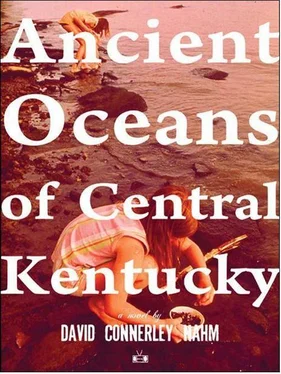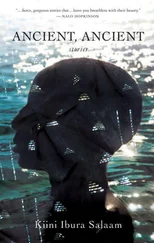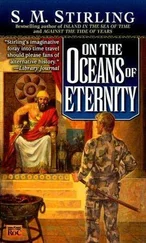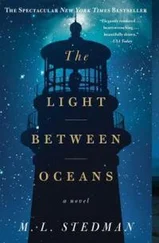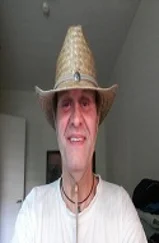“I’ve seen him,” Jacob says.
“Shush!”
When they were in the bathroom, washing the small cuts on their hands, their mother stopped in the door, her arms full of clothes. She looked at her children with a soft smile. She’d been angry when they both came home in ruined clothes, wet and reeking, and Jacob crying, and she’d been ready to take a belt to their thighs, but then she’d seen that they’d hurt themselves, the bloody palms, and she’d been filled with guilt at how angry she’d been and how that anger had felt so good in her lungs for a moment. “Wash up, you all. Wash up.” Tomorrow , she thought, I’ll pray about it. She was tired of praying about her husband, so it felt good to have something else to worry about. Wash where the blood reeks of splintered soil.
Mrs. Shepherd twisted around and looked back at the man. He flicked his tongue out and wagged it below his brown moustache. He would one day fall from a scaffold and end up in the University of Kentucky Medical Center in Lexington with a tube in his throat that allowed a machine to breathe for him. Unable to move, staring at the ceiling for hours when he woke, before they would prop him up and set the television on a station. This, however, is still a number of years off. Right now, he was laughing at the woman and grabbing himself.
The morning air, low lying, pregnant with morning light. Sunlight smeared over the hills and green leaves of the now full trees. All was still, dappled, right. That otherworldly haze draped over the world outside, something reserved for another life.
“I get up pretty early. I start showing houses as early as I can. My husband teaches. We’ve lived here for years. I spend a lot of time driving around, but it’s not so bad, the countryside and all—”
This commute gave Mrs. Shepherd lots of time in her gold Oldsmobile with her audiobooks. Six Steps to Personal Success and Wealth and Weight Loss . Each morning, golden sunrise behind her, she masticated maple-flavored sausage biscuits from Hardee’s, and each evening, sunset behind her, she sipped Biggie-sized sodas from Wendy’s. It kept her out of the house.
“I have a daughter. She runs a nonprofit for women.” There is a moment that she faces when meeting with new clients, the questions about her family, whether she says she has two children and then has to explain the loss of one or whether she says that she only has one and lets it go at that. When she has told people that she has two children and they ask what her son does, she is faced with a second choice — how much detail to go into. “We lost him.” Or, “He’s gone.” Or— What was too much? Too much for her, for the person listening. She never knew the right euphemism. Her instincts told her that people did not like being on the receiving end of such a story, especially in a business setting, when sitting down with a young couple, looking to buy their first home. A young couple with children of their own. Usually she opted to only name Leah and explain Leah’s work, which most people reacted positively to, but on occasion she met someone whom she felt a harmony with, who she sensed would be receptive to the story. Or perhaps she was only giving in, to the detriment of her sales numbers that month, to the sudden and periodic need to speak it, to give voice to her life, her loss. Perhaps the people she told didn’t want to hear this sad story any more than any other person at 10:15 in the morning looking at a 3 br, 2.5 bath, starter home in great neighborhood, great schools, central AC. Maybe her instincts were failing her and she was reading these few wrong. Or maybe some people cared enough that she could sense it. She didn’t know. “Look at how the light comes in.”
“You think he’s really going to do something? Like come here and shoot us up or something?”
“No, that would mean that he had to put pants on and go out.”

The abandoned pool of the Old Country Club was empty, an hourglass. The empty hourglass full of broken glass and sun-bleached cans glittering with slugs. On the crumbling plaster was written names of loves long since dead. Night held remaining moon. In the halls, cries were peeling paper. Horses sense haints. “Some of you are living in loneliness. Like a bird in a sack.” The preacher shuffled his papers, forgot the passage. In the summer, weeks are all the same. “The soil cries with his blood that only the Lord can hear. This mark to protect him against every hand.”
And then her father was gone again, having gone out, back to work. Lost in the spilling arcs, after father, leaves turn white. A storm. He drove her past the cemetery and she could not tell which of them was laughing. For the Public Health, there shall be no corpses in our water. On the page, the plain page, mother’s face, on the street, mother’s face, on the screen, mother’s face. Fruit rots. Smells sweet. Who remembered his name? Crawlers out of nowhere crawled along the walls. A town drowned. Doors battered frames in idle currents. Drifted along the edge in the foamy water thick with wrack. White froth. Splintered branches. Cast of papers and cans. The whole marina burned. A careless cigarette flicked where someone was fueling. A billow. A ripple on the water. Terrified knowing that something unseen moved beneath her.
One girl ate mud. She howled by those two trees on the far end of the playground. We dug for geodes and washed them in the rain, wished for car wrecks and loneliness, dying in each other’s wishes and our own, all the while, rippling like the skirt of bells, trying to ruin one another’s prayer. They held hands. In the sinkhole, black water. Papers bloomed a frost of white around it. Just junk that flittered out of truck beds. A victory of garbage, but where did the garbage go, all of this trash, all of this red wrapping paper ripped in spring from already forgotten trash, where did it go? Papers blossom on the slope by bushes.
Through the clatter, the neighborhood boys climbed the tree, higher, past where Leah climbed, where she came down crying over the splinter, past the rusted wire that passed through the trunk, puckered wooden lips holding it in place and that splinter in her palm and she watched. The man laughing with a glowing red light in his mouth raised the BB gun and fired at the boys’ bare thighs, already red from the gray bark.
The town, sunk low and spread out, a watery sigh rolled off of the slow breathing heaves of hills to the south, lost momentum in between swells of slow-swooning rock. At night, light pin-holed the shapeless ground and shimmered through the murk of trees and houses, a quiet chunk of fallen above in danger of being swallowed. Low sunk and spread out, frightfully black water seeping through the soles of her shoes, old street names. Fluorescent street lamps did nothing to empty the darkness but deepened it with soft light that showed edges and sounded depths. Summer arrived later than usual, scented with weight, slurring along the ground, refracting sullen rock and earth, the ground doubles, the sighing ground sighed. Cascading hollers, bright plumes. From their father’s shoulders Jacob saw the neighbor set off fireworks. Jacob’s eyes wide. Jacob’s mouth open. The whole night drawn in light. Her mother sat on the step and they watched the joyous fires and all of that color with squealing strings of sound, sparkling spirits chased the neighborhood boys down the driveway and through the yard and the neighbor’s father looned. The Shepherds then went in, the lights done. Night like catfish, gills pushed stars to the surface of her face.
“Jacob!” Mrs. Shepherd called. “Jacob! Goddamnit. Jacob!”
Читать дальше
